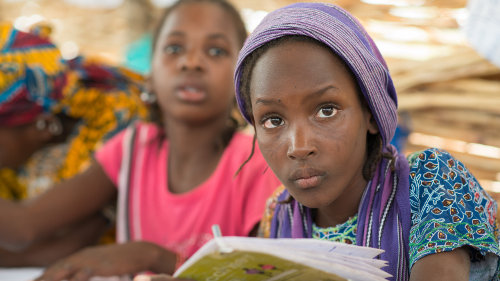Mali and Côte d’Ivoire benefit from a context of favorable financial aid to develop educational projects, while the UN has made school for all one of the pillars of its 2030 Agenda for Sustainable Development .
Multiple initiatives – such as the Education Development Center (EDC) project in Mali, or the distribution of school kits and classes by the Orange Foundation and Dominique Ouattara in Côte d’Ivoire – are emerging in sub-Saharan Africa.
Last February, the UNESCO Institute for Statistics (UIS) revealed that in sub-Saharan Africa, one out of every three young people is out of school – the world average is one in five – girls are more absent classrooms as boys. A year earlier, the UN agency launched a portal dedicated to education on the African continent. Objective: “To educate and train all children and young people by 2030” in sub-Saharan Africa. At the time, UNESCO was not alone in sounding the alarm; the World Bank, for example, had estimated that in Côte d’Ivoire – one of the most dynamic economies on the continent – growth and emergence would not go without reform of the education system.
Funding from international organizations that falls
Nothing makes more sense: “To produce more and better, you need skills, which are acquired largely on school benches, during the years of professional training and within the university,” he said. after a report from the financial institution. UNESCO, for its part, does not say anything else. According to the UN agency, each additional year of schooling could add, not only, 0.37% to the GDP of a country, but also 10% to the income of a citizen.
But according to UIS director Silvia Montoya, the learning crisis – one in ten children does not meet the minimum thresholds for reading or math skills – needs to be addressed and “effective follow-up ensure that all children are in school.
This double challenge has been well understood by some actors in sub-Saharan Africa. At the UN General Assembly held in early October in New York, the World Above All Education Foundation (EAA) and the Islamic Solidarity Fund for Development (ISFD), announced that they would associate to boost African education. The goal ? Build a $ 100 million program for low-income countries. “As the world struggles to overcome the global funding crisis in education, this new program will help eligible countries overcome their lack of access to credit in the international financial market,” said the two actors. in a joint statement.
The first will be responsible for monitoring and evaluating projects implemented with international partners; the second will make available the necessary sums of money to the countries – those must be members of the Islamic Development Bank (IDB), to which belongs the Fund -, which will then benefit from preferential conditions.
The first state to join the program of the two partners, Mali should receive a loan of $ 31 million to finance a project of the Education Development Center (EDC), a global non-profit organization, aimed at providing primary education some 600,000 children. The sum of money should be divided between teacher training, provision of teaching materials and monitoring of student attendance.
“Your success depends only on you and the efforts you will provide in class”
Another program, belonging to the EAA Foundation this time, called “Educate a Child”, aims to bridge the gender gap in access to education, while promoting the skills that children need to find a rewarding job – the ultimate goal of all aid programs. It has already set up, on the African continent, about forty projects, in partnership with local and international NGOs, development banks and companies, and wants to cross in a few years the bar of 10 millions of schoolchildren around the world, according to cheikha Moza bint Nasser, founder and president of EAA. All educational projects, in sub-Saharan Africa, are an integral part of the UN 2030 Agenda for Sustainable Development, of which the mother of the current Emir of Qatar is one of the ambassadors.
This announcement was made last April from Côte d’Ivoire, a country where projects are also multiplying to lead children on the roads of the school. For example, the First Lady and the Orange Foundation each donated hundreds of school kits and three new classes to Gagore sub-prefecture. On September 11, Dominique Ouattara officially launched the ceremony for the delivery of kits for the year 2018-2019, distributed by the Children of Africa Foundation, of which she is president. In her speech, the First Lady also wanted to empower the children present: “Your success depends only on you and the efforts you will provide in class. You will also need to be respectful with your teachers, as you are with your parents [and] listen well in class, “she said.
The official launch of the school kits distribution was accompanied by the inauguration of a public primary school in Yopougon, one of the fifteen communes of the Abidjan district. Built on 3,000 square meters, equipped with seven classrooms, a canteen, a multimedia room and a sports field, the establishment, built by Volunteers of Africa – the foundation of the man of Malian business Samba Bathily, also managing director of Solektra International, an energy company that collaborated in the project, has the particularity of operating on solar energy. And demonstrates that in early childhood education, we can combine efficiency and sustainable development.
François Lamontagne



